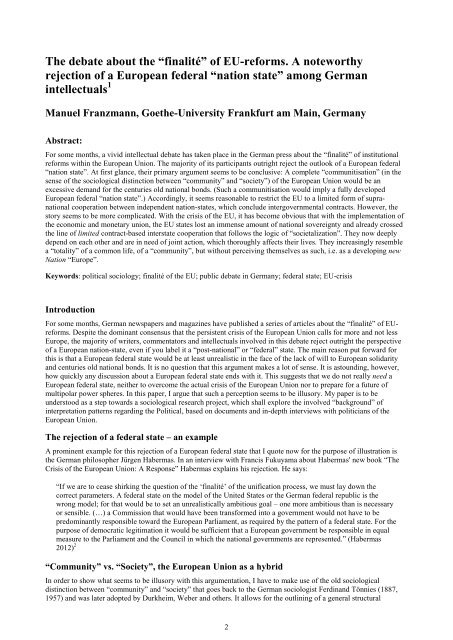Manuel Franzmann The Debate About the Finalité ... - Euroacademia
Manuel Franzmann The Debate About the Finalité ... - Euroacademia
Manuel Franzmann The Debate About the Finalité ... - Euroacademia
You also want an ePaper? Increase the reach of your titles
YUMPU automatically turns print PDFs into web optimized ePapers that Google loves.
<strong>The</strong> debate about <strong>the</strong> “finalité” of EU-reforms. A noteworthy<br />
rejection of a European federal “nation state” among German<br />
intellectuals 1<br />
<strong>Manuel</strong> <strong>Franzmann</strong>, Goe<strong>the</strong>-University Frankfurt am Main, Germany<br />
Abstract:<br />
For some months, a vivid intellectual debate has taken place in <strong>the</strong> German press about <strong>the</strong> “finalité” of institutional<br />
reforms within <strong>the</strong> European Union. <strong>The</strong> majority of its participants outright reject <strong>the</strong> outlook of a European federal<br />
“nation state”. At first glance, <strong>the</strong>ir primary argument seems to be conclusive: A complete “communitisation” (in <strong>the</strong><br />
sense of <strong>the</strong> sociological distinction between “community” and “society”) of <strong>the</strong> European Union would be an<br />
excessive demand for <strong>the</strong> centuries old national bonds. (Such a communitisation would imply a fully developed<br />
European federal “nation state”.) Accordingly, it seems reasonable to restrict <strong>the</strong> EU to a limited form of supranational<br />
cooperation between independent nation-states, which conclude intergovernmental contracts. However, <strong>the</strong><br />
story seems to be more complicated. With <strong>the</strong> crisis of <strong>the</strong> EU, it has become obvious that with <strong>the</strong> implementation of<br />
<strong>the</strong> economic and monetary union, <strong>the</strong> EU states lost an immense amount of national sovereignty and already crossed<br />
<strong>the</strong> line of limited contract-based interstate cooperation that follows <strong>the</strong> logic of “societalization”. <strong>The</strong>y now deeply<br />
depend on each o<strong>the</strong>r and are in need of joint action, which thoroughly affects <strong>the</strong>ir lives. <strong>The</strong>y increasingly resemble<br />
a “totality” of a common life, of a “community”, but without perceiving <strong>the</strong>mselves as such, i.e. as a developing new<br />
Nation “Europe”.<br />
Keywords: political sociology; finalité of <strong>the</strong> EU; public debate in Germany; federal state; EU-crisis<br />
Introduction<br />
For some months, German newspapers and magazines have published a series of articles about <strong>the</strong> “finalité” of EUreforms.<br />
Despite <strong>the</strong> dominant consensus that <strong>the</strong> persistent crisis of <strong>the</strong> European Union calls for more and not less<br />
Europe, <strong>the</strong> majority of writers, commentators and intellectuals involved in this debate reject outright <strong>the</strong> perspective<br />
of a European nation-state, even if you label it a “post-national” or “federal” state. <strong>The</strong> main reason put forward for<br />
this is that a European federal state would be at least unrealistic in <strong>the</strong> face of <strong>the</strong> lack of will to European solidarity<br />
and centuries old national bonds. It is no question that this argument makes a lot of sense. It is astounding, however,<br />
how quickly any discussion about a European federal state ends with it. This suggests that we do not really need a<br />
European federal state, nei<strong>the</strong>r to overcome <strong>the</strong> actual crisis of <strong>the</strong> European Union nor to prepare for a future of<br />
multipolar power spheres. In this paper, I argue that such a perception seems to be illusory. My paper is to be<br />
understood as a step towards a sociological research project, which shall explore <strong>the</strong> involved “background” of<br />
interpretation patterns regarding <strong>the</strong> Political, based on documents and in-depth interviews with politicians of <strong>the</strong><br />
European Union.<br />
<strong>The</strong> rejection of a federal state – an example<br />
A prominent example for this rejection of a European federal state that I quote now for <strong>the</strong> purpose of illustration is<br />
<strong>the</strong> German philosopher Jürgen Habermas. In an interview with Francis Fukuyama about Habermas' new book “<strong>The</strong><br />
Crisis of <strong>the</strong> European Union: A Response” Habermas explains his rejection. He says:<br />
“If we are to cease shirking <strong>the</strong> question of <strong>the</strong> ‘finalité’ of <strong>the</strong> unification process, we must lay down <strong>the</strong><br />
correct parameters. A federal state on <strong>the</strong> model of <strong>the</strong> United States or <strong>the</strong> German federal republic is <strong>the</strong><br />
wrong model; for that would be to set an unrealistically ambitious goal – one more ambitious than is necessary<br />
or sensible. (…) a Commission that would have been transformed into a government would not have to be<br />
predominantly responsible toward <strong>the</strong> European Parliament, as required by <strong>the</strong> pattern of a federal state. For <strong>the</strong><br />
purpose of democratic legitimation it would be sufficient that a European government be responsible in equal<br />
measure to <strong>the</strong> Parliament and <strong>the</strong> Council in which <strong>the</strong> national governments are represented.” (Habermas<br />
2012) 2<br />
“Community” vs. “Society”, <strong>the</strong> European Union as a hybrid<br />
In order to show what seems to be illusory with this argumentation, I have to make use of <strong>the</strong> old sociological<br />
distinction between “community” and “society” that goes back to <strong>the</strong> German sociologist Ferdinand Tönnies (1887,<br />
1957) and was later adopted by Durkheim, Weber and o<strong>the</strong>rs. It allows for <strong>the</strong> outlining of a general structural<br />
2











